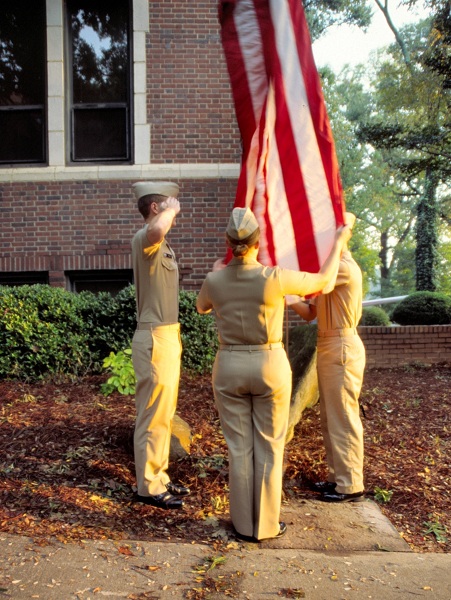
“More than 7,000 lieutenants have received their commission from the Yellow Jacket Battalion, including two winners of the Congressional Medal of Honor. Alumni have served in every campaign from World War II, Korea, Vietnam, the Cold War, and more recent operations including Desert Storm, Operation Enduring Freedom as well as Operation Iraqi Freedom,” written on The Navy ROTC (NROTC). The NROTC division began in 1926 at Tech as the first of 6 similar university units.
The ROTC program rewards its students based on merits and requires the students to take basic calculus and physics courses. There is also mandatory physical training which “helps [personnel] maintain a healthy lifestyle… Cadets are often responsible for not only executing their own PT, but planning, and supervising the PT of their subordinates while constantly observing for safety and the well being of everyone involved.”
Some famous alumni from the ROTC include Lieutenant Colonel Boyd Parsons, ISyE ‘71; former Georgian Govenor, U.S. President and Nobel Prize winner Jimmy Carter and Captain John W. Young, USN (Retired) AE ’52 AE who became “the world’s most experienced space traveler with two Gemini missions, two Apollo missions and two Space Shuttle missions.”
ROTC Students have many opportunities for leadership, scholarship and training. The NROTC battalion Public Affairs officer Ben Wattam, a third-year MGT major, mentioned his military background influenced his decision to join. Most ROTC students indeed have a military background. Some of the benefits offered through the program include full health care, scholarship for college and 50 percent pay after retirement.
However, more than monetary benefits, Wattam noted that most students join the ROTC because they want to serve.
“Someone has to do it,” Wattam said about the fear and thought process behind the decision to serve.
He said that his biggest fear in his service is not the commitment to defending the country.
“[My big fear is] going out to leave what you’re used to and also how things can change while you were away,” Wattam said.
Wattam hopes to become a pilot for the Navy.
Midshipman David Klotz, a third-year MGT major, began at the naval divison of the ROTC in 2008. Klotz also hopes to be a pilot once he graduates.
“[The program] also lets you have a normal college experience that is more similar to what life will be like…ROTC classes are also way smaller than Naval Academy classes, so students get more opportunities to lead and learn by doing,” Klotz said.
Still, Klotz has had to make several adjustments since joining.
“I put on about 20 pounds of muscle. [I] have developed leadership skills and confidence that will be of great value to me for the rest of my life,” Klotz said.
Klotz believes there are other benefits to the program as well.
“[My favorite part of NROTC was] getting sent around the world to go on training ‘cruises.’…I got to spend three weeks on it watching jets and learning about aviation from pilots,” Klotz said.
He has had the opportunity to go to a carrier which operated in the Arabian Sea.
Wattam had a different favorite aspect of the group.
“[My favorite part is] the people I meet, whether they are older lieutenants or classmates…[who] share your ideals and principles,” Wattam said.
Many students on campus do not realize what ROTC students do.
“Whenever people see us, they don’t really know who or what we are or what to make of us. The bigger issue is that people have little to no idea why we’re here, what we do and what we’re training to do,” Klotz said.
Wattam and Klotz both noted the compatibility of the quality of education at Tech and the quality of the ROTC programs offered here.
“I believe that it is also due to the reputation that Tech has for its rigorous academics… Many from Georgia Tech’s NROTC go very far in the Navy,” Klotz said.
Wattam attributed some of the skills he has developed from both ROTC and Tech classes, such as time management and the ability to work under pressure as abilities that have helped him very much in the past few years.
“[The training emphasizes] attention to details and being on time push us towards excellence,” Wattam said.